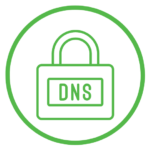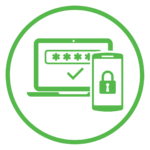In today’s digital age, securing your data and systems is more challenging than ever. Cyber threats are constantly evolving and, with the addition of AI, getting increasingly sophisticated. Moreover, in recent years, there has been a significant shift as many businesses have moved to the cloud. This shift brings both opportunities and challenges, especially when it comes to cybersecurity. In this blog, we will dive into those challenges and then provide our top seven cloud subscription services for enhanced security.
Potential Security Risks in the Cloud
Unfortunately, the widespread adoption of cloud subscription services by organizations in recent years has become a big target for cyber criminals. Oftentimes, these organizations mistakenly believe they’re immune from traditional malware attacks. This isn’t the case. Although most cloud service providers invest heavily in their security measures, they’re still vulnerable to data loss, data breaches, account hijacking, and insider threats.
Additionally, many compliance issues arise from the shared responsibility model, which clarifies how security responsibilities are divided between cloud service providers and their customers. In theory, the cloud provider is responsible for the security of the cloud platform, while businesses are responsible for the security of their data stored in the cloud. However, ensuring that your security team has correctly implemented its side of the shared responsibility model can be challenging.
Top 7 Security-Enhancing Subscription Services
Although various security risks are associated with the cloud, businesses can mitigate these challenges by using the following subscription services specifically designed to enhance security.

Antivirus, EDR, XDR, MDR
Antivirus software detects, prevents, and removes malicious software (viruses) from your computer. It typically works by scanning files and programs for patterns of code that are characteristic of known malware.
EDR (Endpoint Detection and Response), XDR (Extended Detection and Response), and MDR (Managed Detection and Response) are all advanced security solutions that go beyond traditional antivirus software. EDR detects and responds to suspicious activities on individual endpoints. XDR expands on EDR to include additional parts of the IT environment, such as networks and cloud services. Lastly, MDR provides outsourced monitoring and management of your security infrastructure. Basically, it provides detection and response as a managed service.

Domain Based System (DNS) Protection
DNS protection enhances security by adding an extra layer between your employees and the internet by identifying and blocking malicious sites and filtering out any unwanted content. This helps prevent DNS hijacking, which occurs when someone redirects you to a different website than you intended to visit.

Email Encryption
Email encryption is a security measure that encrypts, or disguises, the content of email messages. This protects potentially sensitive information, ensuring the email can only be read by the intended recipients.

Email Phishing
Phishing is a huge cyber threat for companies today. It usually involves a fake email from a trusted source, asking for sensitive information or for the recipient to take urgent action. These scammers aim to trick victims into giving away login credentials or clicking harmful links. Learn more about phishing here.

Email Threat Protection
Email threat protection is a combination of security measures and technologies used to detect, prevent, and mitigate email-based threats before they reach your inbox. These threats can include phishing attacks, malware, ransomware, and any other form of malicious content.

Multifactor Authentication (MFA, 2FA)
Multifactor authentication enhances security by requiring two or more verification methods beyond a simple password to gain access to an account. These additional layers can include facial recognition, fingerprint scanning, and unique passcodes so even if one factor is compromised, unauthorized access is still difficult.

Vulnerability Scan/Report
There are many areas within a network that are vulnerable to a security breach. These risks range from minor to critical security exposures. A vulnerability scan reviews open ports and critical IPs to help you target potential vulnerabilities, such as outdated software, missing patches, or areas that could be exploited by hackers. We recommend scheduling a vulnerability assessment annually.
Why Work with Digicorp?
Subscription services are constantly evolving and need to be evaluated on an annual basis. This is an investment we’re willing to make for our customers. Things change. What you have for licensing this year might not be what you need for next year. Without a trusted partner alerting you of these changes, you may end up paying too much for what you currently have or continue to subscribe for services you no longer need.
At Digicorp, we actively advocate on our customer’s behalf. We explore different combinations and options specifically chosen for your organization to ensure you’re protected, fully served, and that you’ve got the most cost-effective and fair prices in place. Lastly, we provide you with the information you need so you don’t have to spend time doing additional research elsewhere.
Help Us Help You!
Fill out the form below, and let’s start the conversation. Simply select the subscription services you’re interested in and provide us with an estimate of your number of users. A dedicated Digicorp representative will reach out to you shortly to explore the best solutions for your business needs.





